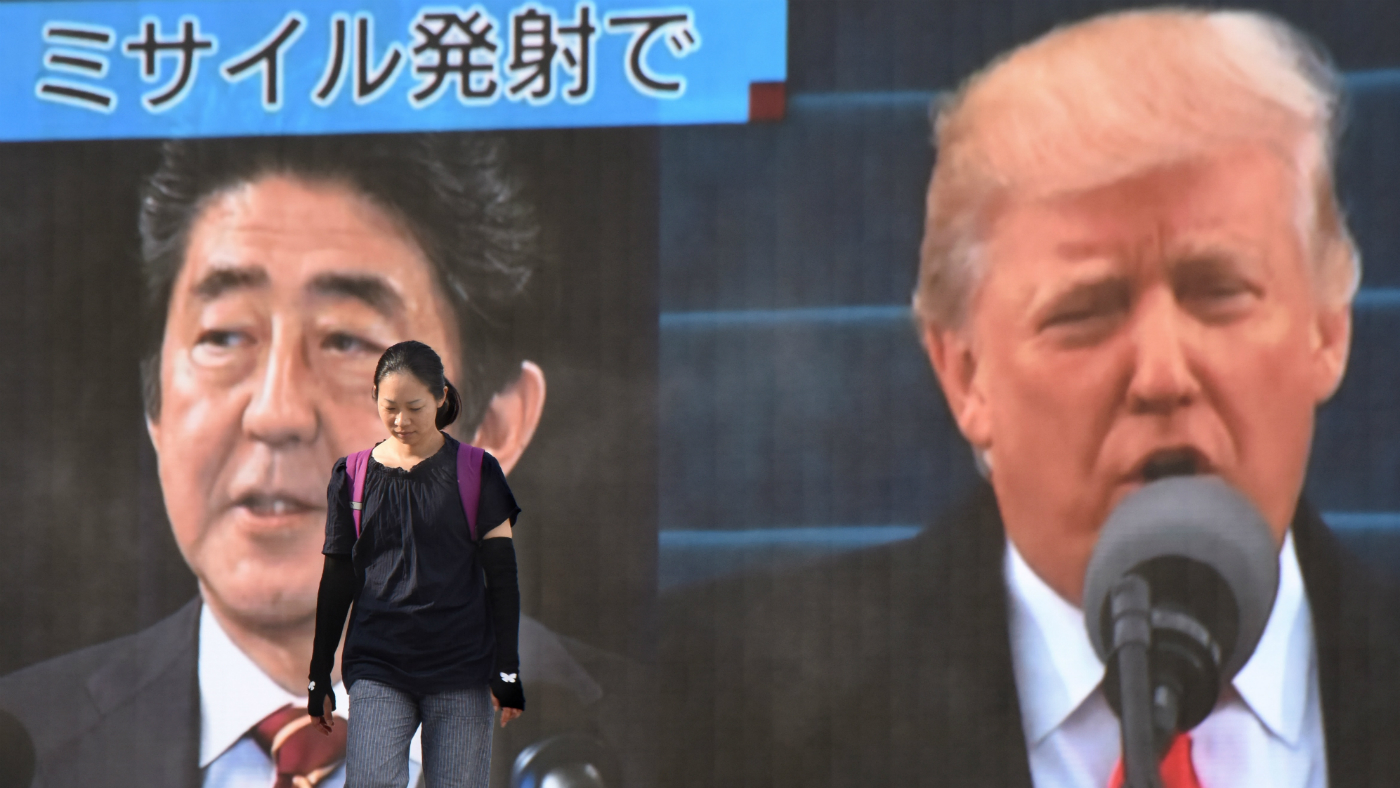How to avoid nuclear catastrophe in North Korea
Donald Trump says 'all options are on the table' as the UN convenes in New York and Theresa May flies to Japan

A free daily email with the biggest news stories of the day – and the best features from TheWeek.com
You are now subscribed
Your newsletter sign-up was successful
The UN Security Council will convene an emergency meeting tonight to discuss North Korea options after Pyongyang fired a ballistic missile over the Japanese island of Hokkaido.
Theresa May, who flies to Japan today, said she was "outraged" by the "reckless provocation", while Shinzo Abe, the Japanese Prime Minister, said he favours "increased pressure on North Korea in cooperation with the international community". Donald Trump said that "all options are on the table".
But what options are left to deal with Kim Jong-un and the rogue state of North Korea?
The Week
Escape your echo chamber. Get the facts behind the news, plus analysis from multiple perspectives.

Sign up for The Week's Free Newsletters
From our morning news briefing to a weekly Good News Newsletter, get the best of The Week delivered directly to your inbox.
From our morning news briefing to a weekly Good News Newsletter, get the best of The Week delivered directly to your inbox.
Step up economic sanctions
On 5 August, the UN Security Council passed sanctions blocking $1bn (£770m) worth of North Korean exports in industries including seafood, coal and iron ore. China, which accounts for about 90 per cent of North Korea's foreign trade, also buys crude oil, textiles and clothing from Pyongyang, which could be targeted with new sanctions.
"With no data being reported, oil might be a way to either squeeze - or support - the regime without any outsiders being able to scrutinize what they are doing," Kent Boydston, research analyst and Asia expert at the Peterson Institute for International Economics, said in a blog post.
Dialogue
A free daily email with the biggest news stories of the day – and the best features from TheWeek.com
China's foreign affairs spokeswoman Hua Chunying today urged the US and allied countries to refrain from provocative action: "Pressure and sanctions cannot fundamentally solve the issue,” she said. "The only way out is through dialogue and consultation." This may be what Kim is looking for: the "prestige of negotiating directly with a superpower is something North Koreans really, really want", Robert Kelly, associate professor at Pusan National University, told CNBC. But "there's no way the US is going to give that to North Korea without some really significant concession".
Turn the screws
The US and its allies may opt for a limited attack or series of conventional military attacks using aerial and naval assets, possibly including narrowly targeted Special Forces operations, according to The Atlantic.
"These would have to be punishing enough to significantly damage North Korea’s capability—but small enough to avoid being perceived as the beginning of a preventive strike. The goal would be to leave Kim Jong-un in power, but force him to abandon his pursuit of nuclear ICBMs," the magazine says.
Full-scale attack: The 'fire and fury' option
Trump has already threatened Kim with "fire and fury" should North Korea threaten the US or its territory in Guam with nuclear-tipped intercontinental ballistic missiles.
He then upped the rhetoric, reports CNN, saying the US military was "locked and loaded".
Today, the US President's language was less dramatic, the Washington Post reports. Button-holed by a reporter and asked what he plans to do about North Korea, Trump said: "We'll see, we'll see."
-
 The ‘ravenous’ demand for Cornish minerals
The ‘ravenous’ demand for Cornish mineralsUnder the Radar Growing need for critical minerals to power tech has intensified ‘appetite’ for lithium, which could be a ‘huge boon’ for local economy
-
 Why are election experts taking Trump’s midterm threats seriously?
Why are election experts taking Trump’s midterm threats seriously?IN THE SPOTLIGHT As the president muses about polling place deployments and a centralized electoral system aimed at one-party control, lawmakers are taking this administration at its word
-
 ‘Restaurateurs have become millionaires’
‘Restaurateurs have become millionaires’Instant Opinion Opinion, comment and editorials of the day
-
 Will increasing tensions with Iran boil over into war?
Will increasing tensions with Iran boil over into war?Today’s Big Question President Donald Trump has recently been threatening the country
-
 Corruption: The spy sheikh and the president
Corruption: The spy sheikh and the presidentFeature Trump is at the center of another scandal
-
 Rubio boosts Orbán ahead of Hungary election
Rubio boosts Orbán ahead of Hungary electionSpeed Read Far-right nationalist Prime Minister Viktor Orbán is facing a tough re-election fight after many years in power
-
 Greenland’s capital becomes ground zero for the country’s diplomatic straits
Greenland’s capital becomes ground zero for the country’s diplomatic straitsIN THE SPOTLIGHT A flurry of new consular activity in Nuuk shows how important Greenland has become to Europeans’ anxiety about American imperialism
-
 Epstein files topple law CEO, roil UK government
Epstein files topple law CEO, roil UK governmentSpeed Read Peter Mandelson, Britain’s former ambassador to the US, is caught up in the scandal
-
 Iran and US prepare to meet after skirmishes
Iran and US prepare to meet after skirmishesSpeed Read The incident comes amid heightened tensions in the Middle East
-
 Which way will Trump go on Iran?
Which way will Trump go on Iran?Today’s Big Question Diplomatic talks set to be held in Turkey on Friday, but failure to reach an agreement could have ‘terrible’ global ramifications
-
 Israel retrieves final hostage’s body from Gaza
Israel retrieves final hostage’s body from GazaSpeed Read The 24-year-old police officer was killed during the initial Hamas attack